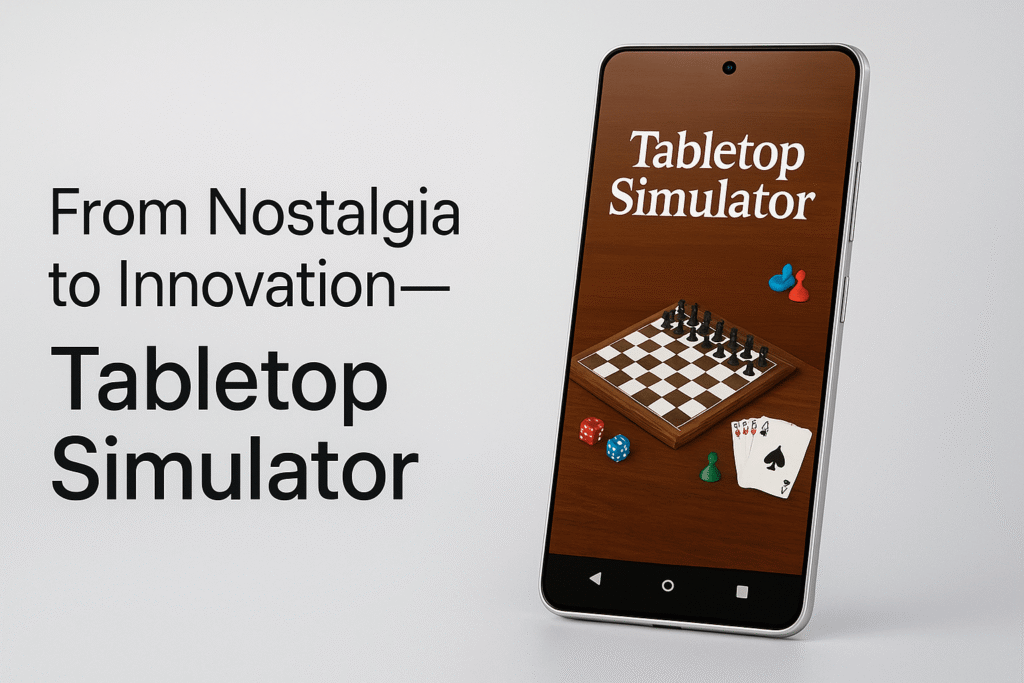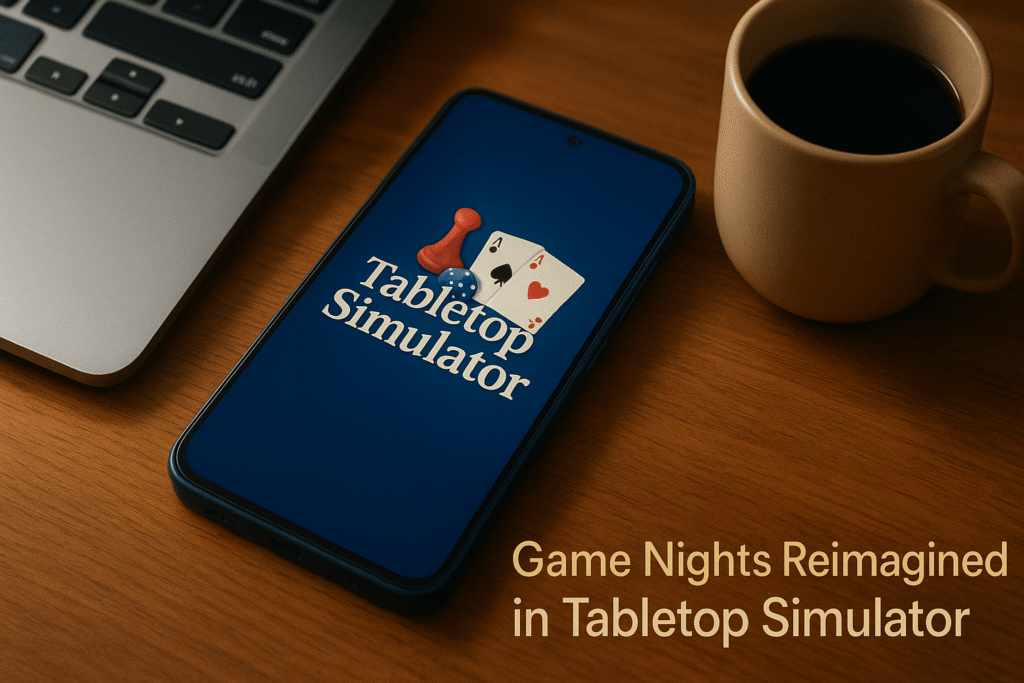There’s a strange kind of electricity in the room when people gather around a table—not the glowing blue of a screen, but the quiet pulse of anticipation before the first move is made. It’s the same feeling that lingers in childhood memories of candlelit board games during power outages, when the world outside was dark but the space between players felt alive. In our age of endless scrolling and fragmented attention, that atmosphere has almost slipped away—yet it has found an unexpected rebirth in the digital realm.
Tabletop Simulator isn’t just software; it feels more like a secret doorway. One click and the clatter of dice, the shuffle of cards, the tension of a single decision—all of it returns. The irony is beautiful: a machine, often accused of isolating us, becomes the bridge to shared moments we thought belonged to the past.
Every session feels like stepping into a room without walls, where imagination builds the furniture and human connection provides the light. And the more you lean into it, the more you realize it isn’t about the games themselves but about the people who choose to sit across from you, even when miles apart.
This isn’t nostalgia. It’s proof that play, when given space, can be as timeless as memory itself.
The Hidden Appeal of Tabletop Simulator
What makes Tabletop Simulator so compelling isn’t just the games—it’s the feeling it recreates. At its core, the platform revives the charm of sitting around a real table, dice in hand, and friends within reach, but adapts it to the digital age. Unlike traditional online games, it doesn’t dictate how play should unfold. Instead, it gives players the tools to build, customize, and experiment. This creative freedom, mixed with nostalgia, creates a uniquely personal experience. Tabletop Simulator thrives because it feels less like software and more like a blank canvas for social connection, strategy, and storytelling.
Why it resonates more deeply than many online games
Most digital games focus on speed, competition, and distraction. Tabletop Simulator does something different—it slows time down. Instead of rushing through levels or chasing achievements, you sit at a virtual table where every move is deliberate, every pause meaningful. The satisfaction comes not from the game itself but from the presence of others. That’s why people return to it more than quick-fix apps or flashy titles. It creates an atmosphere that feels strikingly human, even when players are miles apart.
The blend of nostalgia, innovation, and creativity
Few platforms capture memory and imagination in the same breath. Tabletop Simulator does this by blending the tactile joy of dice and cards with the limitless potential of digital tools. Nostalgia surfaces in familiar games, yet innovation shines through the freedom to invent entirely new ones. Creativity becomes the real game—whether you’re building custom boards or reshaping classics. This fusion of old and new makes it more than entertainment; it feels like a living canvas where players paint their own shared stories.

Features That Make It Stand Out
Tabletop Simulator shines because it doesn’t limit itself to prepackaged titles. Players can create custom boards, modify card decks, and even import community-built mods that transform the experience. With multiplayer support, friends across the world can gather for virtual game nights as naturally as if they were in the same room. The sheer variety is unmatched—you can switch from a timeless favorite like chess to an experimental fan-made creation in seconds. This open ecosystem of creativity, accessibility, and social connection makes Tabletop Simulator less of a game and more of a hub for shared imagination.
Custom boards, cards, and mods
One of the most liberating aspects of Tabletop Simulator is its openness. You’re not confined to pre-built sets; you can design a board, craft a card deck, or sculpt new pieces entirely from scratch. For hobbyists and aspiring designers, it’s essentially a workshop disguised as a game. Communities thrive on this, sharing thousands of mods that transform simple sessions into endless discoveries. That creative freedom is what separates it from platforms that lock players into rigid structures.
Multiplayer game nights across distances
Distance used to end weekly game nights, but Tabletop Simulator revives them in digital form. Friends scattered across cities—or continents—can still gather at the same table. The experience isn’t passive; it’s alive with conversation, playful rivalries, and the occasional chaotic accident of virtual physics. Unlike traditional online games, it recreates the social rhythm of in-person gatherings, where the joy lies less in winning and more in being together.
Endless variety: from classics to experimental creations
Tabletop Simulator feels like an infinite library of games that never closes. From timeless favorites like chess and Monopoly to experimental indie creations you’ve never heard of, the variety is staggering. Because the community constantly builds and shares content, the catalog expands every week. That means boredom is practically impossible—you can jump from a childhood classic to a brand-new invention in the same night. It’s this ever-changing landscape that keeps the platform fresh long after the first play.
Pros and Cons of Tabletop Simulator
Like any platform, Tabletop Simulator comes with strengths and limitations. On the positive side, it offers unparalleled flexibility, allowing access to countless games without needing to buy every physical set. Its thriving modding community means the library never stops expanding. It also saves money and space, replacing shelves of boxes with one digital collection. On the downside, the interface can feel overwhelming for beginners, and the experience relies heavily on a stable internet connection. Technical glitches occasionally interrupt play, and some players miss the tactile feel of real cards and dice. Still, its pros often outweigh the cons.
Pros: flexibility, variety, cost savings, creativity, community mods
Tabletop Simulator delivers flexibility that traditional board games can’t match. You only need one purchase to unlock a universe of content, making it cost-effective compared to buying dozens of physical boxes. Variety ensures there’s something for everyone, from casual players to hardcore strategists. The real magic, however, is in creativity and community—mods let players reshape old games or bring bold new ideas to life. This collaborative energy is what keeps the platform evolving.
Cons: learning curve, reliance on internet, technical glitches, less tactile feel
Of course, no platform is flawless. Tabletop Simulator carries a learning curve, especially for players who aren’t comfortable navigating virtual spaces. A stable internet connection is a must, which can create barriers in less reliable environments. Technical hiccups—glitches or misaligned pieces—sometimes break immersion. And while the simulation is powerful, it can’t fully replicate the tactile charm of shuffling real cards or rolling dice in your hands. These trade-offs matter, but for many, the benefits outweigh them.

Comparison: Tabletop Simulator vs. Other Digital Platforms
When stacked against rivals, Tabletop Simulator shows why it’s a category leader. Compared to Board Game Arena, it offers more customization and depth, though with a steeper learning curve. Against Tabletopia, it edges out with stronger mod support and fewer paid restrictions, giving players more freedom to experiment. Of course, physical board games remain irreplaceable for their tactile charm and face-to-face interaction, but Tabletop Simulator bridges that gap with unmatched convenience. It’s not about replacing physical play but about expanding possibilities—especially for those who want variety, creativity, and global multiplayer flexibility in one unified space.
vs. Board Game Arena (ease of use vs. flexibility)
Board Game Arena excels in simplicity. It’s easy, streamlined, and perfect for quick play. But that very simplicity limits creativity. Tabletop Simulator, on the other hand, is more flexible—nearly every element is customizable. If you value convenience, Board Game Arena might win. If you crave freedom and experimentation, the simulator offers far more.
vs. Tabletopia (free vs. paid features, mod support)
Tabletopia feels polished and accessible, especially with its free-to-play model. But it lacks the deep mod support that makes Tabletop Simulator endlessly versatile. With mods, players aren’t just consumers—they become creators. That difference means one platform is a showroom, while the other is a workshop. For many, the workshop is far more rewarding.
vs. Physical Board Games (convenience vs. tactile experience)
Nothing will replace the feel of dice in your hand or the sound of shuffling cards. Physical games hold a sensory magic Tabletop Simulator cannot fully replicate. Yet the digital format offers undeniable convenience: instant setup, no missing pieces, and play across any distance. It’s not a replacement but a complement—a bridge between tradition and modern connectivity.
Why Players Are Choosing It Today
The surge in Tabletop Simulator’s popularity isn’t accidental—it reflects how people want to connect in today’s world. Families use it to recreate shared traditions when gathering in person isn’t possible. Long-distance friends rediscover the joy of game nights without travel. Indie designers showcase prototypes, testing mechanics before committing to expensive production runs. It’s more than entertainment—it’s a tool for creativity, bonding, and collaboration. The combination of accessibility and versatility makes it especially appealing in 2025, when digital spaces increasingly serve as stand-ins for physical ones, yet still manage to preserve the intimacy of shared play.
Families seeking connection
In busy households, carving out quality time is harder than ever. Tabletop Simulator gives families an easy way to reconnect after long days. Whether it’s parents revisiting classics with kids or siblings inventing something entirely new, it transforms screen time into shared time. The laughter and small victories remind everyone that games still have the power to bond generations.
Long-distance friends bonding over play
Friendship often weakens with distance, but Tabletop Simulator acts as a glue. It turns virtual hangouts into meaningful events, replacing passive texting with active play. These nights become rituals, keeping friendships alive even across oceans. For many, it’s not just a game—it’s a lifeline that keeps people feeling close when geography says otherwise.
Game designers testing and showcasing ideas
For indie creators, the platform is a testing ground. Tabletop Simulator lets designers prototype quickly, share with a global audience, and refine based on real feedback. Instead of waiting months for physical production, ideas can be brought to life instantly. This democratization of design has opened doors for countless creators, making it one of the most unexpected benefits of the platform.

The Emotional Side of Digital Board Gaming
Board games have always been about more than rules or strategy—they’re about laughter, tension, surprise, and connection. Tabletop Simulator preserves that emotional core, even when the players are miles apart. The act of flipping a card, rolling dice, or watching a friend bluff translates surprisingly well into digital form. Many users report that it feels less like “screen time” and more like quality time. The platform captures those subtle dynamics of play that make gaming memorable—friendly rivalries, inside jokes, or shared victories—proving that emotions can thrive even in a purely virtual environment.
Recreating the “table” atmosphere virtually
What makes board games special isn’t the pieces—it’s the table. Tabletop Simulator manages to recreate that environment, even through a screen. The chatter, the jokes, the side conversations—they all happen naturally, just as they would around a physical table. That recreated atmosphere is what elevates sessions beyond being “just digital.”
Storytelling, laughter, and human connection
At its core, Tabletop Simulator isn’t about mechanics or graphics; it’s about connection. The stories that emerge during play, the laughter over small mistakes, the shared silence before a crucial move—these moments are where its true magic lies. It doesn’t try to replace real life; it simply extends the reach of human connection into places it couldn’t reach before.
Common Misconceptions & Surprising Truths
Some newcomers assume Tabletop Simulator is just another video game with preset titles, but this is a misconception. It’s not about playing one fixed game—it’s about creating and experiencing infinite possibilities. Others believe it replaces the joy of physical board games, but in truth, it complements them, offering a convenient way to play when meeting in person isn’t possible. Another common myth is that it’s too technical for casual players. While the interface may appear complex at first glance, most find it intuitive after a short learning curve. Ultimately, it’s a versatile platform, not a competitor to tradition.
Why it’s not “just another video game”
It’s tempting to lump Tabletop Simulator into the same category as mainstream video games, but that misses the point. Unlike games built on competition or storylines, this is a platform for interaction. Its success comes from players shaping the experience, not consuming it. That distinction is what makes it unlike anything else.
How it extends—not replaces—the board game experience
Some fear digital board gaming threatens the tradition of physical play. In reality, Tabletop Simulator often inspires players to return to their shelves, eager to relive the same games in person. It doesn’t erase the original—it preserves it by making play accessible when gathering physically isn’t possible. In that way, it extends the culture rather than eroding it.
Tips for Getting the Most Out of Tabletop Simulator
Best mods and curated community content
The real treasures of Tabletop Simulator come from its community. Thousands of mods expand the library far beyond the base package, often reimagining classics or adding unique twists. Exploring curated lists ensures you find polished, high-quality content without sifting through everything yourself.
Shortcuts & tools to smooth gameplay
Efficiency matters when learning a new platform. Tabletop Simulator offers built-in shortcuts—such as grouping cards or snapping pieces—that reduce friction during play. Mastering these tools makes sessions smoother, helping everyone focus on the fun instead of fumbling with mechanics.
Hosting unforgettable digital game nights
Hosting in Tabletop Simulator is more than sending a link. It’s about setting the atmosphere: choosing the right game, creating a relaxed vibe, and encouraging conversation. When done right, these nights feel every bit as memorable as physical ones, proving that connection doesn’t need walls or a table to thrive.
The Future of Shared Play
How digital platforms reshape the meaning of “together”
Technology often pulls people into isolated corners, yet platforms like Tabletop Simulator redefine togetherness. They transform devices into spaces of presence, reminding us that “online” can mean genuinely shared moments.
Why hybrid play (digital + physical) may define the future
The future of gaming likely isn’t a choice between screens and tables—it’s both. Hybrid play lets people gather physically when possible and continue digitally when distance intrudes. Tabletop Simulator is proof that the boundary between the two is thinner than we think.

FAQ
Is Tabletop Simulator worth it in 2025?
Absolutely. With a one-time purchase unlocking infinite games, the value grows each year as the community expands. It’s an investment that keeps paying off.
Can I play with friends who don’t own the same game?
Yes. As long as one player owns the base platform, everyone in the session can access shared games and mods.
Is it beginner-friendly?
It takes a session or two to adjust, but the interface quickly becomes second nature. Tutorials and guides make the process easier.
Does it support VR?
Yes, and the experience adds an extra layer of immersion. However, VR is optional, not required.
Are there free games available?
Many. The Steam Workshop is filled with community-created games that cost nothing extra to enjoy.
Conclusion & Call to Action
Reinforce that play is about people, not pieces
Games are vessels; people are the heartbeat. Tabletop Simulator thrives because it recognizes this truth, placing human connection at the center of its experience.
Encourage readers to try the platform with curiosity and openness
The next time you long for connection, consider opening this virtual table. Bring your imagination, invite someone you care about, and see what unfolds—you might find it feels more real than you expect.


1 thought on “The Silent Magic of Tabletop Simulator”